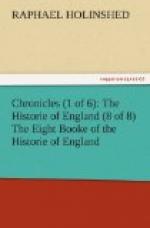[Sidenote: Gen. 2.] Samothes the sixt begotten sonne of Iaphet called by Moses Mesech, by [Sidenote: De migr. gen.] others Dis, receiued for his portion (according to the report of Wolfgangus Lazius) all the countrie lieng betweene the riuer of Rhene and the Pyrenian mountains, where he founded the kingdome of Celtica [Sidenote: Cent. 1.] ouer his people called Celtae. Which name Bale affirmeth to haue bene indifferent to the inhabitants both of the countrie of Gallia, and the Ile of Britaine, & that he planted colonies of men (brought foorth of the east parts) in either of them, first in the maine land, and after [Sidenote: Anti. lib. 1. Bale Script. Brit. cent. 1.] in the Iland. He is reported by Berosus to haue excelled all men of that age in learning and knowledge: and also is thought by Bale to haue imparted the same among his people; namelie, the vnderstanding [Sidenote: Caesar. comment. lib. 8.] of the sundrie courses of the starres, the order of inferiour things, with manie other matters incident to the morall and politike gouernment of mans life: and to haue deliuered the same in the Phenician letters: out of which the Greekes (according to the opinion of Archilochus) [Sidenote: In epithet. temp. De aequinorus contra Appionem.] deuised & deriued the Greeke characters, insomuch that Xenophon and Iosephus doo constantlie report (although Diogenes Laertius be against it) that both the Greekes and other nations receiued their letters and learning first from these countries. Of this king and his learning arose [Sidenote: Lib. de Magic. success. lib. 22.] a sect of philosophers (saith Annius) first in Britaine, and after in Gallia, the which of his name were called Samothei. They (as Aristotle and Secion write) were passing skilfull both in the law of God and man: [Sidenote: Script. Brit. cent. I.] and for that cause exceedinglie giuen to religion, especiallie the inhabitants of this Ile of Britaine, insomuch that the whole nation did not onelie take the name of them, but the Iland it selfe (as Bale [Sidenote: De ant. Cant. cent. lib. I.] and doctor Caius agree) came to be called Samothea, which was the first peculiar name that euer it had, and by the which it was especiallie [Sidenote: This Ile called Samothea.] knowne before the arriuall of Albion.
[Sidenote: MAGUS THE SON OF SAMOTHES. Lib. 9. Annius in commen. super eundem. Geogr.] Magus the sonne of Samothes, after the death of his father, was the second king of Celtica, by whome (as Berosus writeth) there were manie townes builded among the Celts, which by the witnesse of Annius did beare the addition of their founder Magus: of which townes diuers are to be found in Ptolomie. And Antoninus a painfull surueior of the world and searcher of cities, maketh mention of foure of them here in Britaine, Sitomagus, Neomagus, Niomagus, and Nouiomagus. Neomagus sir Thomas Eliot writeth to haue stood where




